We offer a range of services which are available to all our clients.
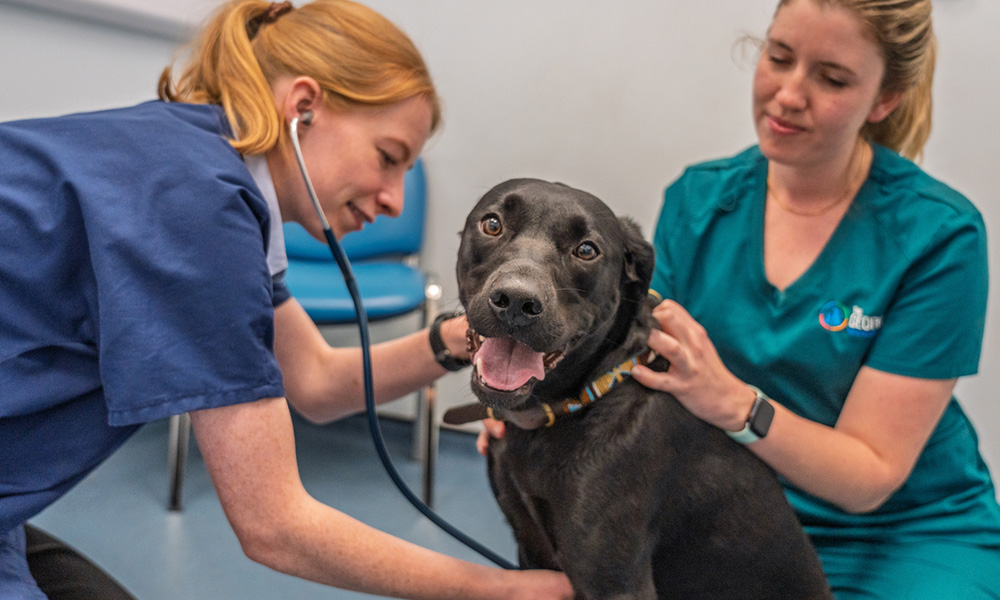
Consultations
Our vets offer a wide range of consultations, from routine checks to diagnosing and treating conditions, all through pre-booked appointments. Appointments can be made via the link on the website or by calling the practice. Urgent cases will always be seen as a priority, so please call us directly for an emergency.
We also offer a range of appointments with our highly experienced registered veterinary nurses (RVNs) who run several types of clinics, providing advice aimed at promoting your pet’s health & wellness. These are available at all locations.
Read more
What does RVN mean?
RVNs (registered veterinary nurses) are recognised, regulated and registered professionals. After years of training, veterinary nurses register with the RCVS (Royal College of Veterinary Surgeons) and are subsequently required to undertake 15 hours of CPD (continued professional development) each year and practice to a Professional Code of Conduct.
What Consults can RVNs do?
At all our locations, our RVNs offer clinics aimed at helping you manage long-term conditions, such as diabetes or arthritis. They will also perform minor procedures such as nail trims.
Please see below for a list of appointments offered by our RVNs:
2nd vaccines (puppy and kittens): Administering the second part of the vaccine, 3-4 weeks after a veterinary surgeon has given the first.
Puppy checks: A monthly check until the puppy is 6 months old which provides an opportunity for a puppy to come into the practice and get used to being handled, examination and being in a clinical environment. This is also a chance for the owner to ask questions as well as checking on your puppy’s growth.
Librela, Cytopoint and Solensia: Administering monthly injections, under the prescription of a Veterinary Surgeon.
Suture removal: Removing sutures from any recent surgeries that have been performed here at the George.
Nail Clips for cats, dogs, rabbits etc.
Post Op Checks for animals following surgery, including wound care and answering any questions from the owner.
Blood sampling and taking any bloods that the vet has requested.
Tick removals – removing safely
Microchipping of dogs and cats.
Laser:Performing laser therapy on a variety of cases including wound management and arthritis. These must be referred from the vet.
Desensitisation: Helping any animal desensitize to a particular issue they have. Whether that be generally coming into the vets or from handling methods. We want every animal that comes to us to feel happy and safe.
Pre-neuter checks on dogs and cats before booking them in for a routine neutering surgery.
Dressing changes: Removing and changing any types of dressing, under the instruction of a treating veterinary surgeon.
Expressing of Anal glands
Weight management: Creating a weight management protocol for individual pets, advising on different diets and tracking their weight loss journey.
Dematt: Clipping/brushing any matts that have occurred in cats, dogs, rabbits etc.
Blood pressure checks: Monitoring the blood pressure in those animals with underlying conditions that are being managed by a veterinary surgeon.
End of life care: Assisting our clients with decision making when their pet is nearing the end of their life, as well as assisting in the euthanasia process.
Dental health: Teaching owners about oral hygiene for cats and dogs including ways to help prevent dental disease.
Medication administration: Assisting with the administering of a range of medications that have been prescribed by a veterinary surgeon. This includes eye drops, ear meds and oral meds.
Senior cat clinics: A regular check in for our senior cats, which includes checking weight, urine, blood pressure and among other health checks.

Emergency Care
We are proud to provide emergency care, around the clock; 24 hours a day, 365 days a year. Our on-call service is provided by our own vets and nurses, so you will only ever see a familiar face, with access to your pet’s full medical records. We are passionate about continuity of care, ensuring your pet receives the same high standard of treatment, day or night.
Please call us on 01666 823165 in an emergency.
Read More
What do I do in an emergency?
If you have an emergency case, please call the practice on 01666 823165. During the day, select option 1, which will put you straight through to our client care team. Let us know that you are on your way to us, with a brief description of what is wrong, and the team will then be able to prepare for your arrival. During out of hours (7pm-8.30am weekdays, and 4pm Saturday through to 8.30am Monday), call on the same number and select option 1 for the emergency line. Your call will be directed to our paging service, who will take your details, and then the duty vet will be contacted. One of our vets will then call you to arrange to see your pet and give you instructions on where to go during out of hours.
Please note that urgent or emergency consults come with an additional cost; please see our cost of care page for more information on this.
Where will my pet be seen during an emergency?
Our out of hours service is provided at our hospital in Malmesbury.
If my pet has to stay with you, where will they be?
If we recommend your pet should be hospitalised, this will be at our own hospital in Malmesbury. Your pet will not need to be transported to another out of hours provider. Our facilities include separate cat and dog wards where your pet will be monitored closely 24/7 by a dedicated hospital nurse.

CT
We have a brand-new CT machine which enables us to get incredibly detailed images of your pet if required, helping us reach a diagnosis quickly & accurately. CT (computed tomography) is an advanced imaging technique which produces cross sections of the body, containing more detailed images than a conventional x-ray. One of our vets will advise you if we feel this would be useful for your pet.
Read More
Will my pet need to be sedated for the CT?
Your pet will need to be heavily sedated or under general anaesthetic for a CT scan. Your vet will discuss which is the most appropriate for your pet; this is assessed on a case-by-case basis to make the procedure as safe as possible.

Laparoscopy (keyhole)
Laparoscopic (or keyhole) surgery refers to a method of accessing the abdomen via small incisions (‘the keyholes’), facilitating entry of specialised equipment, including a camera, into the abdomen. Magnified and clear images are then relayed to a large screen in the operating theatre. It is a much less invasive procedure, providing several benefits for your pet. We are proud to be able to offer this service for certain surgical procedures.
Read More
What surgical procedures can we do laparoscopically?
Our most common laparoscopic procedure is for the neutering/spaying of female dogs. Where clinically indicated, we also offer laparoscopic castrates for retained testicles in male dogs and for certain abdominal biopsy procedures too.
What are the benefits of Laparoscopic surgery?
- A recent study concluded laparoscopic spays caused less surgical stress and up to 65% less post-op pain, due to the smaller incisions and a reduction in the abdominal retraction and manipulation required. We find that patients that have had laparoscopic spays tend to ‘bounce back’ to normal, quicker than the traditional spays, particularly for larger breed dogs.
- The entire procedure is performed through a few keyhole incisions (0.5-1cm) rather than a larger abdominal opening. Smaller incisions are less painful and reduce recovery time.
- Decreased risk of wound infection
- With a laparoscopic bitch spay the bitch’s activity restriction is less critical during the post-surgical period (although restriction to lead exercise is recommended for 10 days)
- Laparoscopy allows better visualisation of abdominal organs.
- Controlled incisions eliminate the pain and bruising caused by the tearing of tissue.
Is there an increased cost for Laparoscopic surgery?
Laparoscopic procedures come at an increased cost compared to the traditional surgery. This is due the higher level of surgical expertise required, additional training and the cost of the equipment needed for this type of surgery.
Our team will discuss the options and costings with you prior to any decision. Our recommendations will always be on a case-by-case basis. Please see our cost of care page for more information on pricing.

Dentistry
Dental health is a very important but often overlooked part of your pet’s wellbeing. Like us, our pets can develop a build-up of plaque, which can lead to gum disease and painful infections. During routine consults we will check your pet’s teeth and may recommend preventative dental care or dental treatment.
Read More
What happens during a dental procedure?
Dental procedures for pets are always carried out under general anaesthetic. This is essential because they must remain completely still for a long period of time. It also allows us to protect their airway from the water used with dental instruments. Once your pet is asleep, we carefully remove any heavy calculus (the hardened plaque) and then assess, and chart, each tooth. Diseased or damaged teeth will be extracted where clinically indicated and, in some cases, your pet will have dissolvable stitches placed in their extraction sites to aid healing. The remaining teeth are then thoroughly scaled and polished. In many cases, and especially in cats, we will also recommend dental x-ray. This aids detection of any dental disease hidden below the gumline and can help identify teeth that need to be extracted and to plan the best treatment for any teeth.
We will then call you after the procedure and once your pet is recovering from their anaesthetic to update you and arrange a convenient collection time for later the same day.
Where can I book in for a dental?
We can offer dental procedures at our hospital in Malmesbury and also at our Nailsworth and Tetbury branches.
How much will it cost?
Dental procedures are often difficult to estimate accurately in advance because the calculus (hardened plaque) can obscure how the underlying tooth looks and hide signs of disease. Also, some pets are not fond of us looking in their mouths whilst awake!
The cost of the dental will vary depending on what level of treatment is required – this can vary from a “scale and polish” to multiple complex extractions using a dental x-ray. A guideline of cost can be found on our fees page.
If you would like a rough estimate ahead of booking in, please make an appointment to see one of our vets and they will be able to provide you an estimate based on your pet’s examination.
What can I do for my pet to help prevent dental disease?
Prevention of dental disease starts at home, and this is best done by daily toothbrushing. Tooth brushing should ideally be introduced slowly and should be accompanied by a pet-specific toothpaste. These are usually flavoured, fluoride-free and designed to be safe for your pet to swallow. Daily brushing is the gold standard but even managing a few times a week can be beneficial.
There are many other products which can help in preventing dental disease, including dental chews, special diets and water additives, but sadly nothing is as effective as regular tooth brushing. To learn more about preventative dental help and advice on how to introduce tooth brushing, please book in for a dental health appointment with one of our RVNs.
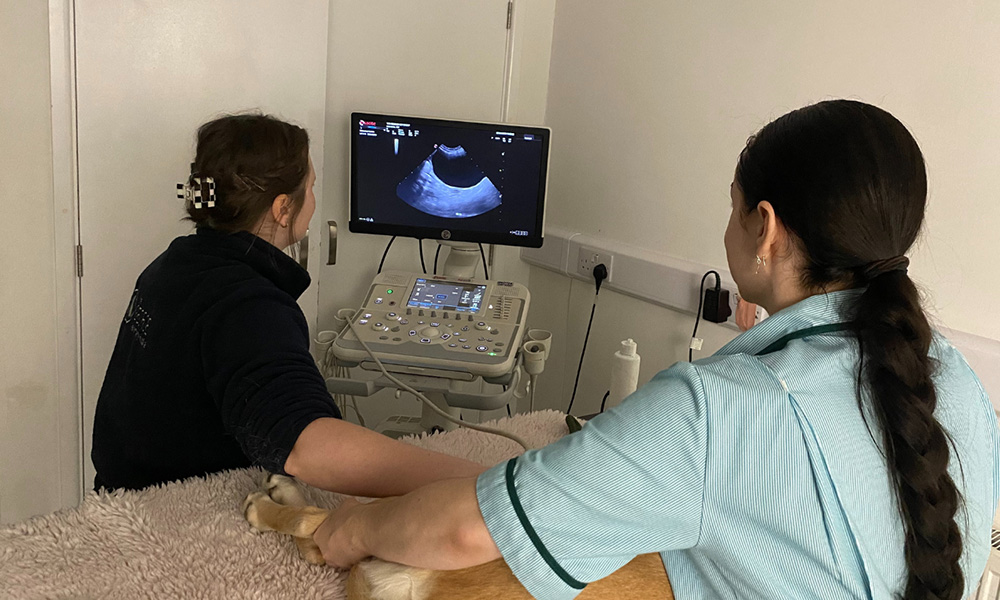
Ultrasound
Ultrasound is a safe, non-invasive type of diagnostic imaging that we utilise to aid the diagnosis of your pet’s condition. It allows us to look at their internal organs in real time and is useful in conditions effecting the heart and abdominal organs. We have a state-of-the-art ultrasound machine, and all our vets are experienced in performing routine ultrasound scans. We also have a heart specialist who visits every month to perform advanced heart scans.
Read More
Will my pet need sedation for an ultrasound scan?
Sedation isn’t always necessary for ultrasound scans. To perform an ultrasound, we clip the fur of the area we are examining and then a probe is applied on the skin with gentle pressure. They are generally very well tolerated while your pet is awake, but we judge whether a case may need sedation on a case-by-case basis. This can vary depending on the type of scan we are performing, whether any additional procedures need to be done at the same time and on temperament of the pet. Your vet will advise you if they feel this would be a useful tool in your pet’s diagnosis and whether they feel sedation is indicated.
Do you offer pet pregnancy scans?
Yes, we can offer pregnancy scans at both Malmesbury & Nailsworth. These are only to confirm the pregnancy and cannot guarantee numbers. We recommend waiting until day 28-30 of the pregnancy as this is the earliest they can be detected via ultrasound. These appointments require longer time slots so please let us know when you are booking in.

X-Ray
X-rays are another type of diagnostic imaging, used to take quick & painless images of your pet’s bones and internal organs. We have a dedicated x-ray room with a digital x-ray machine, providing us with high quality images in seconds.
Read More
Will my pet need sedation for x-rays?
In most cases, sedation or general anaesthetic is required for obtaining x-ray images. This is because your pet needs to remain perfectly still, often in unusual positions, for us to capture clear and accurate images that help aid diagnosis. In occasional circumstances, and depending on a pet’s temperament and health, we make take x-rays while they are awake; but each case is assessed individually, and your vet will recommend the safest, most appropriate option.
How much will it cost?
The cost of x-rays varies depending on the amount we need to take, and the cost of sedation or anaesthetic required to take them. Your vet will be able to give you an estimate for the procedure on request.
BVA Hip & Elbow Scoring – what do I need to know?
BVA (British Veterinary Association) Hip & Elbow scores are part of a scheme run with the Kennel Club (KC) to assess the joint health of breeding dogs to reduce the risk of hip and elbow dysplasia, both commonly inherited conditions that can lead to painful joints and have serious implications on the health, welfare and behaviour of a dog.
The scheme uses x-rays of the hips and/or elbows of your pet to screen them for any changes suggestive of hip or elbow dysplasia, and these are awarded a score by a panel of expert veterinary surgeons. Breeders wishing to reduce the prevalence of hip and elbow dysplasia should look to select their breeding stock with a score less than the breed mean score (published by the BVA).
We can provide the x-ray images at our hospital in Malmesbury. Images of the hip and elbows can be obtained at the same time under general anaesthetic, and then these images are sent to the BVA for scoring.
Requirements for hip & elbow scores:
- Your dog must be at least 1 year old
- They must be permanently and uniquely identified with a microchip
- If applicable, your dog’s Kennel Club registration certificates must be available before taking the x-rays, so that their KC number can be printed onto the x-rays.
The cost of taking the x-rays varies depending on how many x-rays are being taken (i.e. just hips or elbows, or both) and the weight of the dog, as this effects the cost of the anaesthetic drugs required. We are happy to provide you with an estimate for your pet – please contact us.
For the scoring element, the owner pays a fee directly to the BVA and this is in addition to the cost of taking the x-rays.
Please see the BVA – Canine Health Schemes webpage for more information.
Are X-rays dangerous for my pet?
Obtaining an X-ray image uses a very low dose of radiation and is considered very safe when used appropriately. We take every precaution to minimise exposure and will only take x-rays when clinically indicated. The clear images obtained are invaluable in helping us to identify problems quickly and accurately, and so these benefits far outweigh the minimal risk.

Vaccinations
Vaccines are a simple but crucial part of preventative health care in pets, helping to protect them against serious and sometimes life-threatening diseases. We offer primary courses for puppies, kittens and rabbits, as well as annual boosters, kennel cough and rabies vaccinations.
Read More
What do we vaccinate against?
The World Small Animal Veterinary Association (WSAVA) publishes guidelines on the vaccination of cats and dogs. It is this information we use to develop our practice protocols alongside knowledge of the diseases present in the local area. The WSAVA split vaccines into ‘core’ and ‘non-core’. Core vaccines are the ones that all cats and dogs should receive after consideration of their lifestyle and geographic location. Non-core are vaccines recommended if the pet’s geographical location or lifestyle puts them at a higher risk of contracting an infection that is not designated as core.
Dogs
Core: Canine Distemper, Infectious Canine Hepatitis (Canine Adenovirus 2), Canine Parvovirus, Leptospirosis
Non-core:Kennel Cough (Canine Parainfluenza virus & Bordetella species)
Rabies (only for travel outside the UK)
Cats
Core: Feline panleucopenia, feline rhinotracheitis, feline calicivirus, feline leukaemia virus
Non-core: Rabies (only for travel outside of the UK)
What are the recommendations for puppy & kitten vaccines?
Puppies & Kittens need an initial course of vaccines before moving onto the yearly dosing schedule.
Puppies will receive two vaccines, 4 weeks apart, and should be at least 8 weeks old before starting.
Kittens will receive two vaccines, 3-4 weeks apart, and should be at least 8 weeks old before starting.
What are the side effects of vaccinations?
Routine vaccinations are very safe, and side effects are uncommon. Some pets may experience mild, short-lived symptoms such as a small swelling at the injection site, mild tummy upset, or tiredness. Very rarely, more serious reactions can occur. If this happens, your vet will carefully review your pet’s needs and advise whether it is safe to continue with future vaccinations.
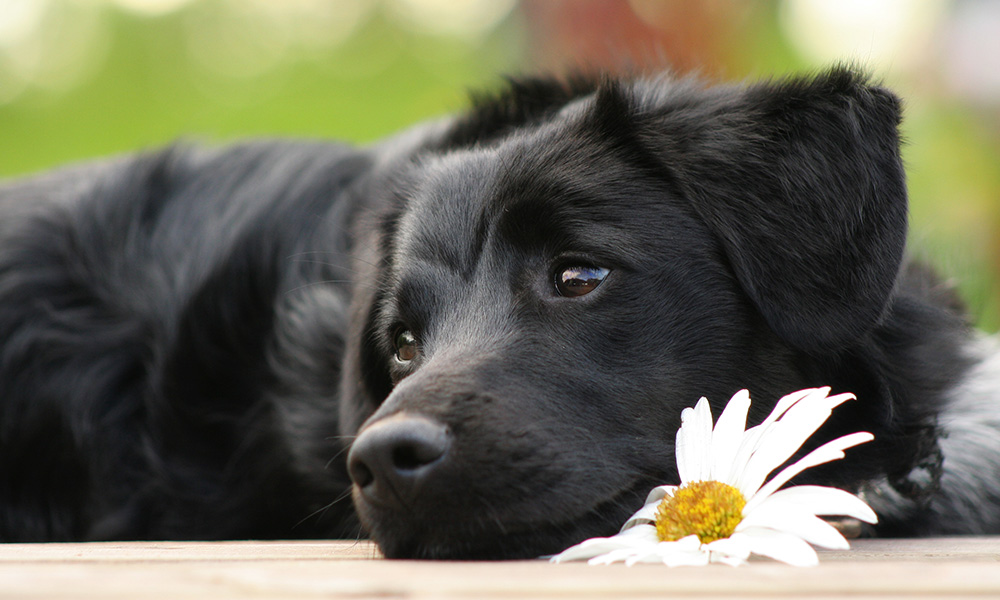
Neutering
Getting your pet neutered (spayed or castrated) can come with several health benefits but we don’t take a blanket approach here at the George. Recent studies have suggested a more tailored approach is best, so we assess each case individually and discuss the pros and cons with the owner to make an informed decision together.
Please contact us if you would like to book in for a pre-neuter check appointment to discuss what is best for your pet.
Read More
What is neutering?
Neutering is a surgical procedure to remove the reproductive organs in animals; this prevents them being able to reproduce and can come with several health benefits also. It is called ‘spaying’ in female pets and ‘castration’ in male pets.
What age should I neuter my pet?
Recent studies have shown that taking a case-based approach on when to neuter dogs is best- this helps to reduce certain risks later in life, and will vary depending on breed, sex and size of dog. Generally, we recommend that female dogs have at least one season, and that neutering should be carried out 3 months after their last season finished.
We encourage you to discuss the timing of neutering for your pet with one of our vets or book in for a pre-neuter check with one of our RVNs.
For cats, we would recommend neutering at 5-6 months old, before they are allowed outside.
Do you offer laparoscopic spays?
Yes! Please see our laparoscopic section for more info.
How much does neutering my pet cost?
The cost of neutering varies on the type of procedure being performed, whether a castration or spay, the method of procedure – if being done laparoscopically – and the size of your pet. Please see our cost of care page for more information on this.
What happens on the day?
- Follow the pre-op guidelines from the day before (sent to you beforehand) – this generally includes a period of fasting to reduce risks associated with the anaesthetic
- Morning admission: at your allocated admission time, our nurses will check your pet, go through the consent form, discuss the procedure, any possible risks, and answer any questions you may have.
- Blood tests (if needed): these are run before the anaesthetic and, if normal, we will proceed with the anaesthetic.
- Procedure: this is carried out safely under general anaesthetic.
- Recovery call: we’ll update you once your pet is waking up and arrange a convenient collection time
- Collection: usually between 3–6pm and once your pet has fully recovered. We will discuss the post-op instructions with you at discharge.
What happens post-operatively?
Your pet will leave us with either a buster collar or wound protecting shirt to prevent them from licking the surgical wound. They may be a little drowsy that evening post anaesthetic and we ask that you keep them strictly rested for the first 24 hours. After that they can have short lead walks only (5 minutes) to allow them to go to toilet. We generally rest them for 7-10 days post-op to ensure the wound heals well and they will often leave with some pain relief provided to have within that time frame. We will see them back twice for post-op checks, generally 24 hours later and again after 7 days.
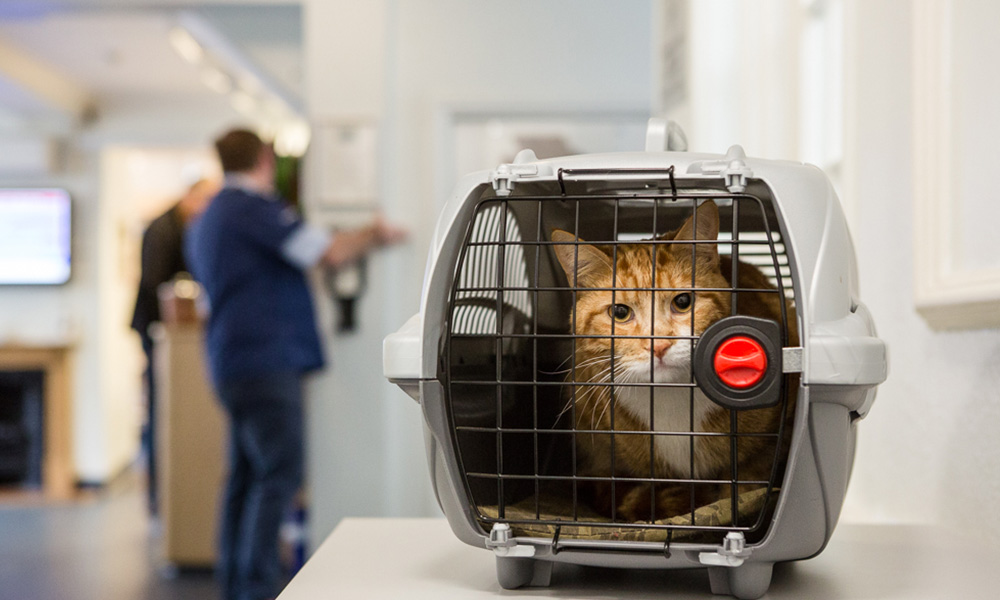
Microchipping
Microchipping is a quick and simple procedure that provides a permanent means of identification for your pet via a chip which is placed under their skin. This chip contains a unique identification number which correlates to your personal information held on an online database. If your pet ever goes missing, the microchip greatly increases the chances of them being reunited with you. It is a legal requirement to have your dog or cat microchipped in England.
Read More
How do I keep my details up to date?
It is important to keep the details associated with your pet’s chip number up to date to ensure you can be contacted in case they ever go missing. To update your details, you must contact the company at which your pet’s chip is registered. Owners are usually provided with a document containing this information either from the breeder or from the vets when a pet is microchipped. It is your responsibility as an owner to keep this information up to date- we are unable to update it for you.
Help! I don’t know if my pet is chipped or what its unique number is!
If you are unsure what your pet’s chip number is or whether they have been chipped, please contact us. We might already have the information on our patient record or otherwise you can book in for an appointment with one of our nurses. They will be able to scan your pet and provide you with any information and on which database it is registered.

Pet Travel
If you are planning on travelling abroad with your pet, there are several important steps and paperwork that we need to prepare to enable this. Depending on the country you are travelling to requirements will vary and sometimes it can be a lengthy preparation process, so it is best to contact us as soon as you are thinking about travelling. Several of our vets are also Official Veterinarians (OVs) and have undertaken additional training which enables them to provide the paperwork for your pet’s travel. If you are booking in for an Animal Health Certificate (AHC) please specify this when booking so we can book you in with one of the OVs.
Read More
Travelling to the EU & AHCs
An Animal Health Certificate is a legal requirement to bring your pet into the UK or take it to a European Union country without quarantine. This has been the case since 2021 and replaced the previous pet passport scheme.
Before applying for an animal health certificate, your dog, cat or ferret must be microchipped and needs to have been vaccinated against rabies. Your pet must be at least 12 weeks old before it can have its rabies vaccine. Your pet must not travel until 21 days after vaccination. This means no pet can travel abroad until 15 weeks of age (12 weeks plus the 21 days wait).
An Animal Health Certificate (AHC) can only be issued by an Official Veterinarian (OV). An OV is a vet who has undertaken additional training and are authorised by the government to create the travel documentation – we have several OVs here at the George.
An AHC must be issued within 10 days of travel and entry into your EU destination. For an AHC to be issued, you need to book an appointment with one of our OVs within the 10-day period, we ask for 2 working days to then prepare your AHC as these are lengthy, highly detailed documents, so please also factor this into your travel plans. We would also recommend not to have it issued exactly 10 days before travel, to allow for any delays when travelling.
During the visit the pet must be accompanied by the owner that will be travelling with the pet or a person authorised in writing by the owner to travel with the pet. We will check your pet’s microchip and ask you to sign the documentation.
NOTE: The owner or authorised person can only be accompanied by a maximum of five pets. You cannot take more than five pets to an EU country or NI unless you’re attending or training for a competition, show or sporting event. You’ll need written evidence of registration for the event when you travel.
Ahead of your AHC appointment:
- Please advise us where you will initially be landing on entry to the EU – this may be different to your final destination, but the paperwork needs to be in the language of the EU country which you first enter. So, for instance if you are travelling to Spain by car but taking the ferry via France, the documents will need to be in French as that is the landing country. We will need to print this off before your appointment.
- You must bring the original hard copy of your pet’s rabies vaccinations (and not a photocopy) – we need to make a copy of it to accompany the AHC.
- Please bring any paperwork regarding microchipping – while not essential, it makes the process a lot easier!
If travelling to Finland, Ireland, Northern Ireland, Malta or Norway, your dog needs to be treated for tapeworms no less than 24 hours and no more than 120 hours before you enter the country. This must be done by a vet and will need to be recorded in the AHC.
Once issued, Animal health certificates can be used for travel to and onwards between EU countries for up to four months from the date your animal enters the EU. NOTE: On return to the UK, each new trip from the UK requires a new AHC to be issued – even when it has been less than 4 months since one was last issued for your pet.
Prior to your return to the UK
Your dog must visit an EU vet to be treated for tapeworms between 24 & 120 hours before entering the UK. This will be recorded on your AHC.
If someone other than the owner is travelling with the animal, then please call us to discuss this first. It must be the owner, or the person who has written permission from the owner to travel with their pet, who accompanies the pet to the appointment to sign the AHC.
We strongly recommend double checking this advice with the relevant government authorities as it is a fluid process that is constantly changing, and it is important that you have the most up to date information. Failure to do this could have stressful and expensive consequences at the border.
What is the cost of an AHC?
Please see our cost of care page for information on the cost of AHCs.
Travelling outside of the EU
If you are taking your pet further afield and are travelling or exporting them outside of the EU, then an Export Health Certificate (EHC) is required. An EHC is the document filled out by our OVs, however with EHCs, the owner must fill out an application form with the government to get the EHC sent to us.
This can be a complicated and lengthy process, and the requirements for an EHC can vary widely depending on the country you are travelling to. This can include additional vaccinations, blood tests, treatments, all at specific times before travel.
The easiest solution is to use a pet travel company that can arrange everything for you. They are informed with the most up to date information for the country that you are travelling to, as procedures and advice can differ from country to country. We are happy to facilitate advice and issue these documents, but ultimately it is the pet owners’ responsibility to find out what is required.
What if my dog has an EU pet passport?
If your pet has a valid and up to date EU passport then you do not need an AHC before travelling back to the EU. You must ensure your rabies vaccination is kept up to date and it must be administered and passport updated in the EU, the booster vaccination frequency may vary depending on the country where it was administered. If your pet’s rabies vaccine has expired, then they will need an AHC to travel to the EU. UK vets can no longer enter rabies vaccine details into an EU pet passport.
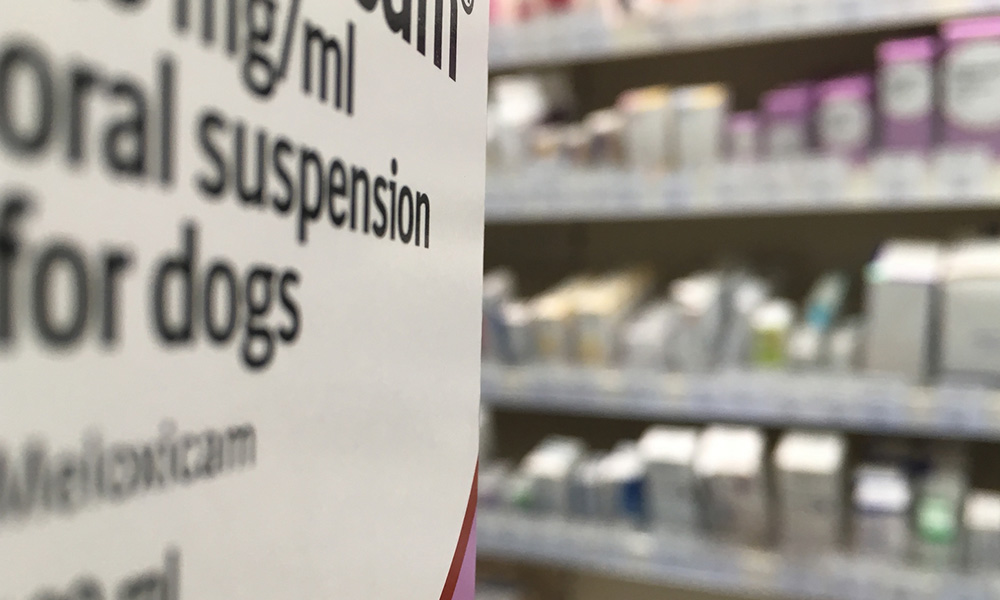
Medicine Requests
Repeat prescriptions are available for pets on long-term medication or for their prescription flea and worm treatments. You can easily request a repeat online, and we kindly ask for two working days’ notice so a vet can review and authorise the request, and to ensure the medication is in stock for you to collect. Medications can be sent to your chosen branch for collection, and we’ll contact you as soon as they are ready. If your request is urgent, please call the practice directly.
Written prescriptions are also available, see below for more details.
Read More
Do you offer written prescriptions?
Yes, we are happy to provide written prescriptions for your pet’s medication. This enables the option to purchase medicines from another pharmacy, often online. Please note, we can only prescribe veterinary medicines following a clinical examination of your pet. Up to four months’ supply can be prescribed at a time (less for controlled drugs), and your pet must be seen every four months for a repeat prescription check-up.
Repeat prescription consultations are offered at a reduced fee, compared to our standard consultation fee. For flea and worming treatments, we can provide a prescription covering up to 12 months.
In certain situations, (e.g. when your pet is hospitalised or requires urgent treatment) a written prescription may not be suitable.
How much medication can I obtain?
For a long-term chronic condition, we can prescribe up to four months’ worth of medication before we need to see your pet again. This is dependent on individual circumstances and the drug in question.
How frequently do you need to see my pet if they are on long-term medication?
Our practice policy is to see your pet once every four months once they are on a long-term medication. This is highly important as these regular checks allow us to monitor their health through their weight, an examination and recent history. We also check for any side effects and make sure this treatment option is still the best option for them.

Laser Therapy
Laser therapy is a non-invasive treatment that emits infrared radiation to help stimulate the body’s natural healing process. It is often used for musculoskeletal conditions, such as arthritis but also can be used for wound healing and several other conditions. We can provide laser therapy sessions at all our locations. Please contact us if you are interested in booking a laser appointment for your pet.
Read More
What is a laser and what are the benefits?
We have a type IV therapeutic laser that works by emitting infrared radiation at a specific frequency and wavelength to penetrate the body’s cells and stimulate natural healing processes.
The main benefits are;
- reduction in inflammation and swelling
- pain relief
- improve/speed up healing
What conditions can benefit from laser therapy?
The laser has a multitude of uses and the settings can be adapted to target different tissues and different goals of treatment. Below are some of the conditions that can benefit from laser therapy:
- Osteoarthritis
- Soft tissue sprains/strains
- Acute traumatic injuries – bruising, swellings
- Tendon damage
- Haematomas
- Gingivostomatitis (gum inflammation)
- Otitis externa (ear infections)
- Surgical wounds
- Traumatic wounds
- Anal gland abscesses
What does it involve for my pet?
Laser is a safe, non-invasive procedure that is generally very well tolerated by our patients. It is performed in a normal consult slot, often with one of our Registered Veterinary Nurses and involves slowly moving the laser over the desired treatment area. No clipping of fur is needed, and neither does the patient require sedation- the laser does not generate any heat or sound, so generally the patients remain quite relaxed.
The procedure usually lasts around 20 minutes, and the laser course is tailored to the individual patient. For chronic cases, such as osteoarthritis, there is usually a six-week induction course (six sessions, over three weeks) and then we move them to a frequency of usually weekly or fortnightly to maintain the benefits seen.
Are there any side effects?
There are no side effects with laser therapy. As with all treatments, some animals will respond better than others but there are no negative effects in the short or long term. There are certain areas of the body to avoid with a laser (eyes, thyroid and lumps) but providing we don’t apply the laser directly to these areas, we won’t cause them any damage or stimulate the lumps to grow.
What does it cost?




